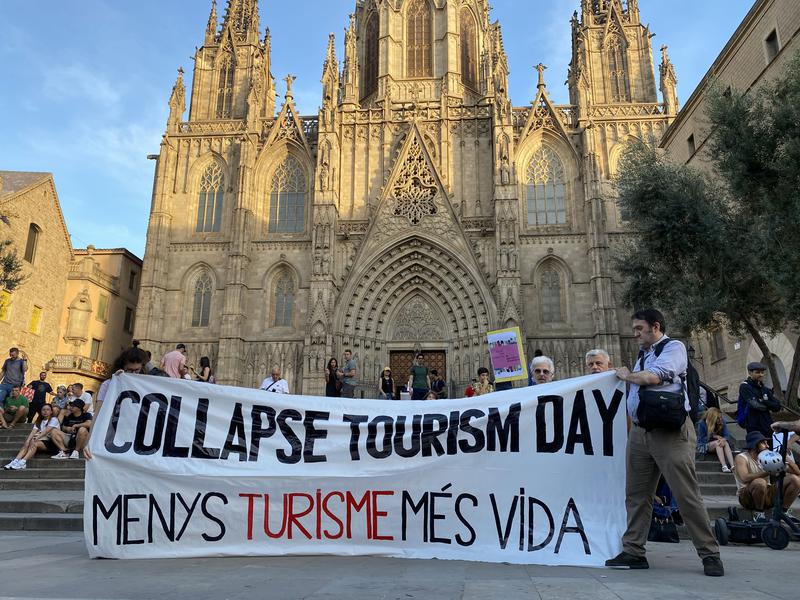Wild tourism makes us say: “turists go home!”


The inhabitants of some of Spain's islands, for example Mallorca, the Balearic islands, are taking to the streets and saying “We don't want tourists!”. For example, six million tourists came to the Balearic Archipelago before the tourism season had even started, and the number of tourists increased by 8 percent compared to last year. Barcelona, which attracts at least twice as many tourists as its population every year, is one of the world's cities whose residents are most fed up with “over-tourism”. It is one of the places where the protests started at the earliest, with banners carrying "Tourists go home". Wild tourism disrupts life in various parts of Spain to such an extent that when the anger of the "hosts" rises at the same rate, some protests occur where tourists are sprayed with water guns or giant beach parties are broken up. Those who do not benefit from their own shores because of tourists can organize protests of thousands of people to take back this right.
Let's put it this way, Amsterdam has a population of just over one million and welcomes around five million tourists every year. Venice, partly due to its unique geography and settlement pattern, has only 55,000 inhabitants. But more than four and a half million tourists come every year. Hawaii, with a population of less than one and a half million, attracts more than nine million tourists every year. It may not be the first place that comes to mind, but the Croatian port city of Dubrovnik, with a population of around 28,000, has received more than a million tourists since 2020. Greece, with Athens and some islands, has been one of the countries most affected by overtourism in recent years. Many cities in Italy and a few spots in Latin America are also suffering from the same problem.
Excessive tourism migrations
The World Tourism Organization of the United Nations, had announced from the beginning that 2024 would be a year in which the number of tourists worldwide would reach a record level, because this is the trend. The industry, which came to a global standstill with the pandemic, seems to have stepped on the gas even more to compensate for the economic loss. The same pause has its equivalent in the eyes of "customers"; the middle class, which is not affected by the global economic recession and inflation – at least at a level that will put an end to tourism activities - wants to travel and relieve the pain of those one or two years spent wearing masks in their own streets.
The impact of this tourism, which is described as extreme or wild, on the residents of the relevant place is, of course, not only crowded; Besides, this is a valid enough complaint. This level of human accumulation means primarily an infrastructure issue. These are infrastructure problems that go beyond the limits of administrative and sectoral preparedness, that cause problems for visitors even during the tourism season, and that the residents will be left with after they return home after taking hundreds of photographs.
The other damage of over-tourism is at the economic level. Those who have experience in Turkey's tourism hotspots will know that this is a factor that drives up prices in everything from services to health; the local economy, temporarily inflated by tourism, spends the rest of the year suffering from this damage.
Accommodating so many people creates a different range of problems: Rental prices generally increase due to houses rented to tourists in various forms. This increase can reach a level that forces city residents to migrate to other "tourism-free" regions. Although mass tourism may periodically appear to be an area of employment for those living in that region, it is not reflected on the local residents as the tourism sector is based on the “tourism” and transfer of cheap labor at the national level. All over the world, the tourism industry is characterized by labor exploitation and conditions that disregard workers' rights and sometimes even human dignity. The campaign of the Ministry of Culture and Tourism during the pandemic comes to mind; The images of hotel workers inviting tourists with masks saying "Enjoy I'm vaccinated, " are haunting.
“Tourists are not welcome”
More tourists than renting accommodation stay in hotels, guesthouses and hostels, which is another destructive dimension of overtourism. Tourism investments, often made at the expense of nature destruction, lead to a change in the character of neighborhoods in city centres. Settlements reconstructed for tourists to stay, have a good time and, of course, shop, are turning into factories focused on tourism income. As small businesses fail to resist this economy, international capital moves into tiny villages; when the tourism season is over, residents cannot find butchers or hardware stores to shop.
The issue also has a psychological dimension. Those who live in places where profit-oriented wild tourism dominates speak of a feeling of occupation. “Tourist” is a problematic subject type that everyone transforms into from time to time. The upper-income group that travels on giant ships and stays in five-star hotels is a small part of this subject. Those who spend the whole year working in a boring job and dreaming of annual leave, who make up a larger segment of the population, can go “wild” at this time of year with a hedonistic ambition focused on getting their money's worth and, even if this is impossible, having enough fun to make up for the year, and this excess begins to be perceived as a right. To put it in the language of the industry, those living in these tourism destinations have to suffer from this "I have to have fun" ambition that borders on arrogance, in addition to their multi-dimensional complaints. This means entertainment that lasts until the morning, uninterrupted noise, beaches full of garbage, dirty streets, gardens turned into toilets. In this world where everyone has become a customer, all that is left is to take to the streets with signs saying "Tourists are not welcome".
Since tourism is a major source of income for countries, generating foreign exchange inflows and tax revenues, there are also moments of national conflict between those who benefit from it and those who suffer from its destruction. “Anti-tourism” advocates are seen as aggressive and radical, accused of not looking after the national interest. The fact that wild tourism changes the distribution of income and increases inequality at the national level suddenly becomes indisputable. On the other hand, the transfer of so many people also points to a global problem in terms of the climate crisis, as buzzing airplanes mean increased carbon emissions.
Turkey, which has a high cultural, historical and natural tourism potential, has also sought to increase tourism revenues in order to overcome economic crises, so all kinds of damage mentioned here are experienced even without “excessive” tourism. Capital's relations with political power and local governments, economic corruption and rent-seeking increase the destruction of tourism at all levels.
There are various measures against wild tourism around the world. As the number of tourist ships visiting Amsterdam and boats touring along the canals has increased dramatically over the last decade, there is talk of a new measure to limit water tourism to a certain quota by 2025. Dubrovnik's local government limited the number of ships even before the pandemic. In Barcelona, the local government is sensitive to restaurants and cafes occupying sidewalks, but this is only a small part of the issue. In general, local governments are looking for ways to get a share of tourism revenues, or at least to recoup resources that have been spent for free.
“Sustainable tourism” is one of the ideas put forward in this context, but given how the ‘green economy’ is being used by capital, there is a high probability that this concept, which even some travel agencies talk about, will also be used by wild tourism. Just as the norms of a few decades ago, such as pesticide-treated agricultural products that pose no threat to human health, are now sold at higher prices, “sustainable tourism” risks becoming the new label for a more expensive tourism. On the other hand, looking for ways to reduce the damage caused by neoliberal capitalism through tourism and to make life in the neighborhood and on the planet sustainable is turning into a new field of struggle.



